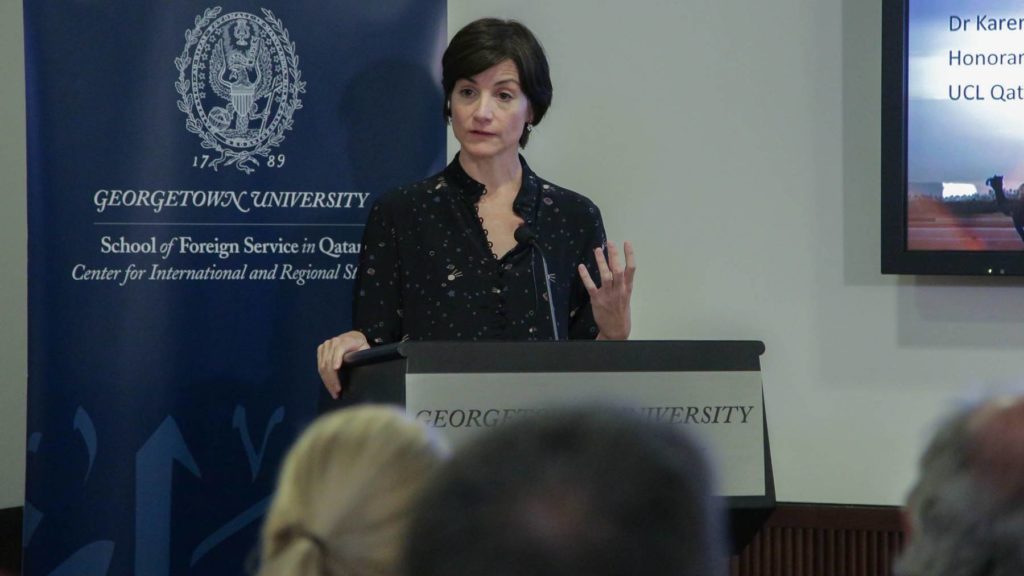A Georgetown University Public Lecture Puts the Region’s Modern Museums in the Spotlight

Global news headlines have been buzzing with commentary regarding the world’s art and museum investments shifting to the energy rich states of the Gulf, and Dr. Karen Exell, Honorary Senior Research Associate at UCL Qatar, sought to explain what that shift has meant for the region. She recently delivered a Center for International and Regional Studies (CIRS) Monthly Dialogue Series lecture titled “Museums and Modernity in the Arabian Peninsula”, where the consultant for Qatar Museums shared some of the key points in her soon-to-be-published book on the topic.
Speaking at Georgetown University in Qatar’s campus, where CIRS is located, she shared that she was inspired to write the book after her preconceptions were challenged over the course of her work setting up the UCL Qatar program in museum practice. “We came with the idea that this knowledge didn’t exist here. But we found that collecting practices have existed in the region for a long time. So I began to focus on how the region engages in modernity through its collecting practices.”
The museum expert launched into a critical overview of how heritage projects and museums are conceived and managed in the Arabian Peninsula by presenting contrasting poles of ultra modern western museums and the small scale local festivals that celebrate and document cultural heritage and historical events.
“Global art as a method of bridging east and west, is repeatedly emphasized in global art projects. I visited two cultural exhibits in Abu Dhabi that acted as “tasters” for the future museums that are set to open on Saadiyat Island as part of the Guggenheim. At the same time, a downtown festival presenting traditional ways of life created an immersive environment. These two events are in complete contrast to each other, in both form and content.”
The heavy investment in global art projects have served to grab the attention of the world, which she explains is the exact intention. “Engagement with western-style museums is a strategic choice of leadership to guard cultural heritage and recently discovered artifacts. More recently, modern museums have helped to brand nations through accessing western arts. So museums aren’t a necessity but are a desire.”
Director of CIRS Dr. Mehran Kamrava introduced the guest speaker, and noted that: “Dr. Excell is also involved in a CIRS research project on art and cultural production in the GCC, and it is wonderful to have someone of her level of expertise contributing invaluable insights at our monthly lecture, as well as on the innovative research we are doing on such a pivotal stage in the region’s development.”
Despite the vast wealth poured into new museum projects, the dramatic impact of their structures in Arab city skylines, and the major media attention they garner, Kelly points out that traditional museum practices that fall below the radar of international attention are also very important.
“The value of regional and private collections lies in the owner and their connection to society. How you access these collections is very different from modern museums. They act as memorialization of local history in a way that traditional western museums fail to do. They’re personal, so you can relate to the events documented in the collections.”
Dr. Karen Exell’s book, Modernity and the Museum in the Arabian Peninsula, will be published by Routledge, and is dedicated to the recent and rapid high-profile development of museums in the Arabian Peninsula. After receiving her PhD from the University of Durham, she taught museums studies and held curatorial positions in university museums in the UK for several years. She directed the MA in Museum and Gallery Practice at UCL Qatar from 2011-2015.